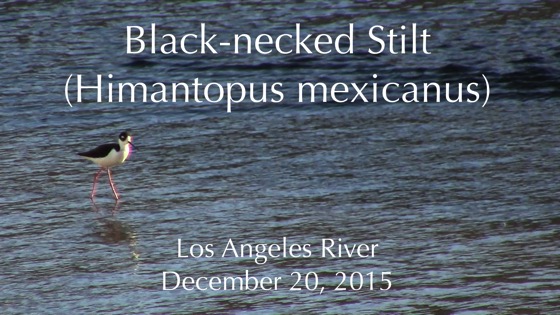1.5 minutes of footage of Black-necked Stilts (Himantopus mexicanus) in the Los Angeles River taken on December 20, 2015 in Burbank, California.
From Wikipedia…
The black-necked stilt (Himantopus mexicanus) is a locally abundant shorebird of American wetlands and coastlines. It is found from the coastal areas of California through much of the interior western United States and along the Gulf of Mexico as far east as Florida, then south through Central America and the Caribbean to northwest Brazil southwest Peru, east Ecuador and the Galápagos Islands. The northernmost populations, particularly those from inland, are migratory, wintering from the extreme south of the United States to southern Mexico, rarely as far south as Costa Rica; on the Baja California peninsula it is only found regularly in winter.[2]
It is often treated as a subspecies of the common or black-winged stilt, using the trinomial name Himantopus himantopus mexicanus.[3] However, the AOU has always considered it a species in its own right, and the scientific name Himantopus mexicanus is often seen. Matters are more complicated though; sometimes all five distinct lineages of the Common Stilt are treated as different species. But the White-necked Stilt from southern South America (H. h. melanurus when only one species is recognized), parapatric and intergrading to some extent with its northern relative where their ranges meet, would warrant inclusion with the Black-necked stilt when this is separated specifically, becoming Himantopus mexicanus melanurus. Similarly, the Hawaiian stilt, H. m. knudseni, is likely to belong to the American species when this is considered separate; while some treat it as another distinct species, the AOU, BirdLife International and the IUCN do not.[4] Thus, in their scheme the black-necked stilt is properly named Himantopus mexicanus mexicanus.[5]
Podcast: Play in new window | Download
Subscribe: RSS
![Black-necked Stilt (Himantopus mexicanus) in the Los Angele River (Silent) [Video]](http://welchwrite.com/blog/wp-content/uploads/2021/01/abstract-tool-bnw-.jpg)



